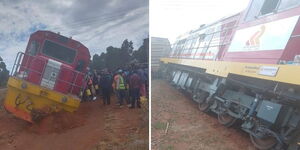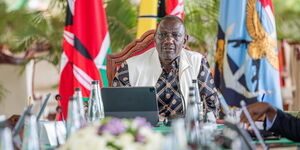The National Police Service (NPS) has issued instructions to its officers to escort fuel tankers at night for the next 72 hours as the government moves to stabilise the fuel situation.
In a statement dated Thursday, April 14 and signed by police spokesperson, Bruno Shioso, officers will be expected to to escort the tankers delivering fuel to far-flung areas that are prone to insecurity.
"As part of the mitigation measures, the Inspector General of police has directed police to provide free movement and escort of all fuel transport tankers during nighttime for the next 72 hours between 6pm and 6am," NPS stated.
Further, the police officers have been instructed to provide security to local petrol stations within their areas of jurisdiction with immediate effect.
"The National Police Service, as a law enforcement agency, has taken cognisance of the persistent situation and joins other state actors in providing solutions to alleviate the difficulties experienced," the police stated.
The action follows the long queues which have been experienced in various parts of the country causing tension to some petrol station attendants.
The announcement by the NPS comes hours after the Energy Cabinet Secretary, Amb Monica Juma, directed oil marketers in the company to either follow the set regulations or vacate the Kenyan market if they are not willing to do so.
It also comes hours after the Energy Petroleum Regulatory Authority (EPRA) announced a Ksh9.9 increase per litre of super petrol, diesel, and kerosene.
In Nairobi, a litre of petrol will retail at Ksh144.62 from Ksh134.72, diesel at Ksh125.5 up from Ksh115.6 while kerosene will sell at Ksh113.55 per litre.
The new prices will take effect at midnight.
Speaking on Thursday, April 14, EPRA Director General, Daniel Kiptoo Bargoria, explained that the landing costs of a litre of super increased from Ksh78.18 to Ksh94.14 per litre. Diesel rose from Ksh78.24 to Ksh97.57 while kerosene rose from Ksh71.57 to Ksh80.05 per litre.
"The average landing costs of super petrol jumped from Ksh78,177.53 (USD 676.70) per cubic metre to Ksh94,137.66 (USD814.85).
Diesel increased from Ksh78,248 (USD 677.31) to Ksh97,571 ( USD844.57) while Kerosene jumped from Ksh71,577 (USD619.57) to Ksh80,054( USD692.95)," EPRA noted.












